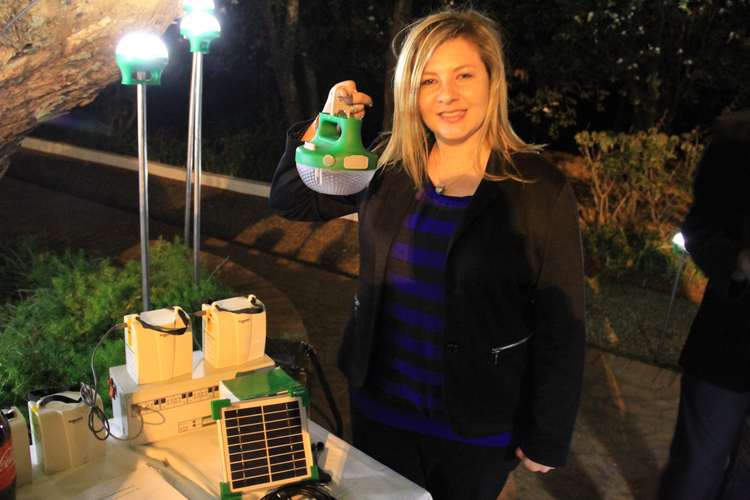
The Sunday Mail

A noticeable thawing in relations between Zimbabwe and Western countries has spurred investor interest.
For European and American companies, the appetite to invest in Zimbabwe has been building for the past 14 years as illegal sanctions adopted by the European Union and US stymied meaningful trade.
Last week, French energy company Schneider Electric signed an exclusive agreement with Samasco, a local renewable energy firm, to distribute solar-powered portable LED bulbs.
The portable bulbs, the Mobiya TS 120S’, are energy efficient, eco-friendly and robust lamps producing 120 lumen light output, perfectly suited for rural communities.
The lamps are also equipped with USB ports which enable users to charge their mobile devices.
France’s Ambassador to Zimbabwe Mr Laurent Delahousse told The Sunday Mail Business that French companies are keen to return.
“We have major French companies in Zimbabwe but they are not enough; the biggest French companies today are Total (petroleum) and Lafarge (cement), but there are also many other smaller companies.
“Schneider Electric is a major electric company and is five times the GDP of Zimbabwe – 20 billion euros – which is absolutely huge. So with this partnership with Samasco, they are showing that they have trust in the market in Zimbabwe and they are going to contribute to the development of solar and renewable energy solutions for Zimbabwe, and in particular, for the off-grid spaces for the rural areas,” said Ambassador Delahousse.
Ambassador Delahousse said French companies were scouting mainly for long-term investments.
“They are investing for 20 years, 30 years so they want to be sure that the economic environment, the business environment and the legal environment brings sufficient stability and clarity so that they can have a long term operation.
“This, I think, the Government of Zimbabwe is working on and we welcome these changes. We welcome the Zim-Asset strategy, which is a good strategy, but it needs to be implemented . . . I think the Government of Zimbabwe has understood these issues and is working towards improving the business-friendly situation so that foreign investors can come because there is a huge need for investment in Zimbabwe.
“There is a lot of mis-perception about Zimbabwe. The country is very different from the bad image it unfortunately still has abroad and we want all of us to work together in partnership to improve the image of Zimbabwe.
“I am helping French companies to invest in Zimbabwe. When I go to France, I meet French companies and I tell them what the reality of the situation is in Zimbabwe and I tell them to come and have a look, seek partners, discuss with people in Government and prepare investments for the future in Zimbabwe.
“About 15 companies are operating in Zimbabwe; some are not as big as Total and Lafarge, but I know for a fact that many more companies are looking at the market in Zimbabwe. They are sending people to have a look, they are preparing a return in Zimbabwe and they are all expecting the right decision to be taken by Government to improve the business environment,” said Ambassador Delahousse.
Indications are that all sanctions on Zimbabwe might be removed before the end of the year. But some European countries are not waiting for that.
Belgium, which houses one of the world’s largest diamond trading centres in Antwerp, is lobbying for the unconditional removal of the embargo so that it can better access gems from the country. Belgium participated at the recent Mine Entra in Bulawayo.
Turkish firms are also queueing for local opportunities with three companies, including Canyon Coal, recently expressing interest in investing in mining, construction and education.
And despite Washington maintaining the Zimbabwe Democracy and Economic Recovery Act (Zidera) – the sanctions legislation passed by America’s Congress in 2001 to forbid official economic ties, private firms have been surreptitiously looking for opportunities for years.
Correspondence from US Embassy in Zimbabwe charge d’affaires Mr David Abell to an American company on September 12, 2012 clearly outlines how American firms have been positioning themselves for local investments.
“Over the past two years, the US Embassy has received a spike in expressions of interest from American firms to establish business linkages with Zimbabwe. Given the country’s impressive resource base, both human and material, we believe that Zimbabwe economic recovery offers significant opportunity for lucrative trade, joint venture, and investment opportunities for American businesses in a variety of sectors.
“Opportunities abound for US business engagements, sales, distribution arrangements and investments in Zimbabwe. While the country faces appreciable political risk, the international media’s portrayal of the country is also often exaggerated . . .
“Business leaders from across the globe are increasingly focusing on the largely untapped opportunities available in Zimbabwe. I strongly urge your company to visit Zimbabwe and see the opportunities for yourself,” reads part of the letter.
The Zimbabwe Investment Authority, a statutory body established to mobilise investments for the country, is targeting to increase FDI from the current US$400 million per year to US$2 billion.







